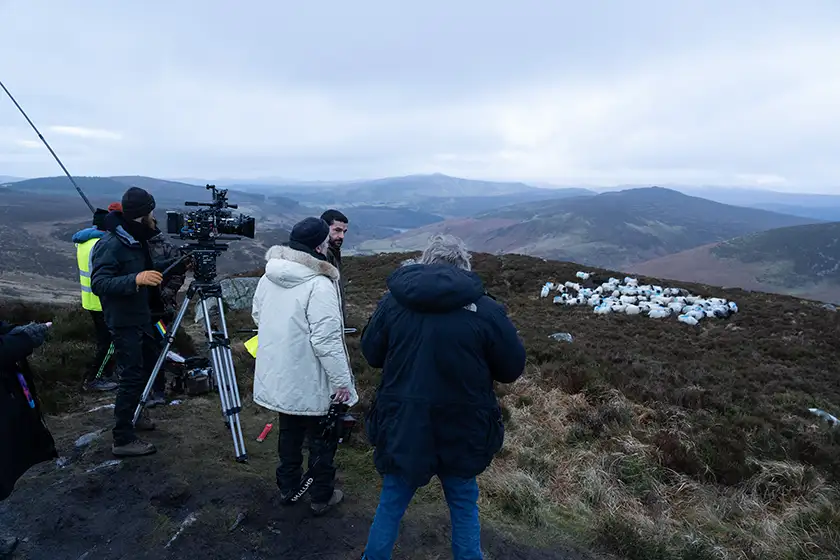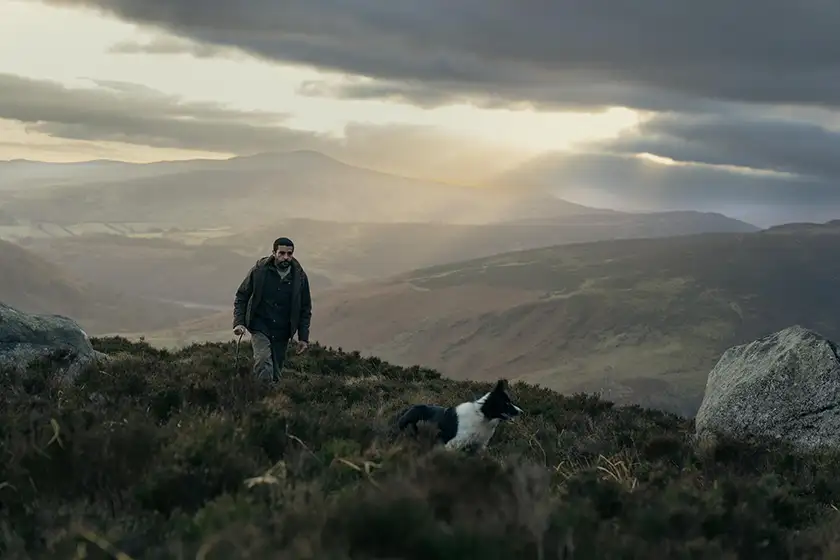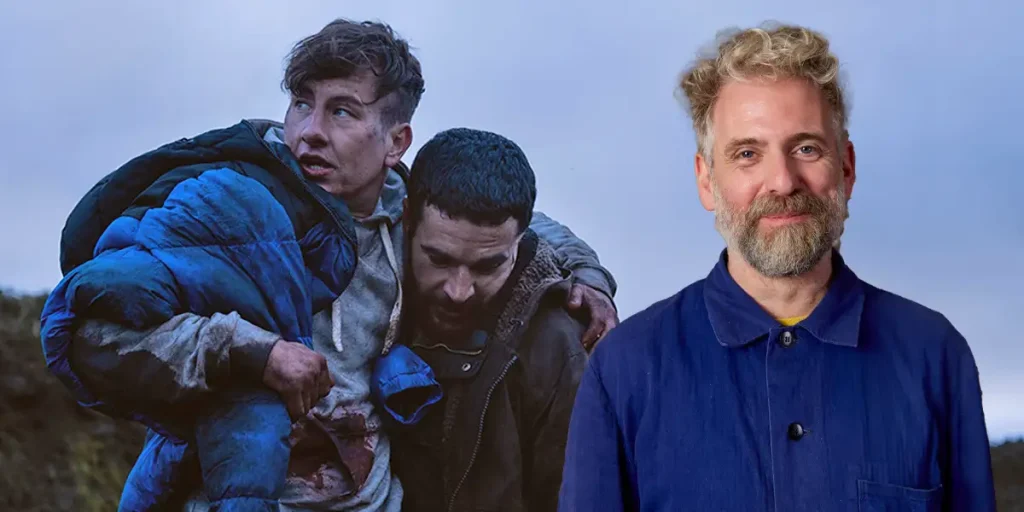We interview Bring Them Down writer-director Christopher Andrews about animal cruelty, male toxicity and the perils of learning Irish.
Bring Them Down is a pared-back tale of revenge left unchecked. In rural Ireland, stolen sheep and simmering rivalry cause two neighbouring farmers (Christopher Abbott and Barry Keoghan) to let their tempers and pasts get the better of them. Told partly in the Irish language, It’s a heavy but tense journey, with the two lead actors keeping you rapt as they plot increasing levels of agony against one another. A superb supporting cast and the rugged Irish landscapes ground the story in a scarily recognisable milieu.
English writer-director Christopher Andrews started his filmmaking career in camerawork before progressing to writing and directing shorts. He makes the leap to feature films with confident and confrontational work in Bring Them Down, leaning into current discussions on the toxic and violent nature of male aggression. We sat down with Christopher ahead of the film’s release to discuss his influences, his casting choices and how to direct in a foreign language. Read the interview below!
Christopher Andrews on his Inspirations for Bring Them Down
What inspired the story of Bring Them Down? Was it something from your own experience?
Christopher Andrews: I read about something that was happening a lot in Cumbria and Derbyshire with sheep about the time that I started thinking about the story. It was part of the story from the beginning. There were these guys going around, cutting the hind legs of sheep and letting them bleed out. Not on the scale that we have in the film, but it was pretty brutal. I did see that kind of thing when I was young.
I was brought up in Cumbria, and I worked on farms when I was at school. One day, I cycled up to this kid’s house after school. He lived in this farmhouse; his dad cut the head off a chicken, and it ran around without a head! It felt like a couple of minutes, but was more like 60 seconds. There was a really weird moment where they thought it was funny, and I started crying. It was quite a haunting experience. I haven’t thought about that for a while, but that wasn’t the reason why I made the film! But I have experienced, and we all have experienced, these awful things somewhere down the line. I was quite young.
Sorry to have dragged all that up! Sounds awful.
C.A.: [smiles] I’ll be alright.

Bring Them Down is both considered and propulsive. What films or artists provided inspiration for you?
C.A.: I’ve always loved genre films, and I’m very much interested in transcendental cinema. Bresson, Dreyer, and then more contemporary filmmakers. Maybe people don’t use that sort of phrase anymore, but someone like Lynne Ramsay, or Jacques Audiard’s work in the late 90s. I also look to Westerns, like High Plains Drifter, where you have this otherness to the world. This felt like an opportunity to be able to make something propulsive, but also exploring a more transcendental space, and more spiritual story arcs, and searching for moments of grace. Those are the kind of filmmakers you aim for. You want to play in that ballpark. Although, you make films, you obsess with cinema, but you don’t ever want to replicate anyone’s cinema.
From an action point of view, the propulsiveness, I love Peckinpah and Kurosawa. It’s those kinds of filmmakers; Kurosawa, especially in the way he directs and photographs action, is just second to none. He’s just amazing on character as well. It doesn’t just resonate on one level:you know these stoic, laconic characters, but you feel what they feel. You can feel everything that’s revolving inside of them. In terms of story, and functionality of the filmmaking, I guess they’re the ones, but then, it’s mostly to do with just finding paintings, photographs and palettes that don’t ape anybody’s cinematic language. It’s about finding its own kind of language.
Bring Them Down’s Setting and Themes
The film delves into ideas around toxic masculinity. What do you hope the film brings to the debate around that topic?
Christopher Andrews: I thought we were doing alright, and then suddenly I felt like I’ve woken up in a world where we’ve regressed so massively in the way that masculinity presents itself, the position of masculinity against femininity, and this very toxic mess that we seem to find ourselves in. Where I grew up, it was very hard to be able to talk about how you felt, and it wasn’t encouraged. In fact, it was frowned upon. If you tried to have a conversation about how you felt in the pub, you’d be told ‘We’ve come for the craic [gaelic, meaning ‘fun’] and to watch the football, and not to listen to you wagging on about how unhappy you are’. I very much felt I was exploring this when I was writing the film.
Bring Them Down is a story of sons bearing the sins of their fathers. Did your own experience feed into that theme?
C.A.: I didn’t have a relationship with my father, because he wasn’t around, but my grandfather had this very strong influence on me. I got many lovely things from him, but also a lot of very problematic things about anger, prejudice, and his frustrations. You think their anger is one thing, but as you grow up, you see that they’re frustrated and trapped in these spaces with no outlet except for quite aggressive, physical outlets. As I was developing this film in the first couple of drafts, I became a father to a little boy, and I was desperate not to pass on all the stuff I’d inherited to him. That became a really big part of it – trying to fold that into the story and think about what a man or a parent’s responsibility is. It’s about what you give to your children, because we can stop this quite quickly, if we work hard, and if we talk to them, we can allow men to be able to talk about their feelings, and to not have it be seen as a sign of weakness.
Violence especially is something that I’ve experienced growing up. When people feel powerless or trapped, violence is an easy thing to go to. To be able to say that you’ve got some power, some agency, usually exacerbates the problem. In my experience, it makes you feel humiliated and awful, which just compounds the sadness inside you, and then circles back. You feel less agency, and then it happens again. It’s cyclical like that. Growing up in rough areas, I’ve known men that have been quite violent, and having talked to and interrogated them a little bit, I know that they’re not happy, and I know that it doesn’t make them feel better, but there’s a bravado and a stamp to it. It’s trying to remove this stuff that seems to be crippling.
Christopher Andrews on his Cast
You got two great lead actors for Bring Them Down. How did Barry Keoghan and Christopher Abbott come to the project?
Christopher Andrews: It was the script, really. The script went to WME [talent agency], who represent both Christopher and Barry. It was quite fortuitous; that wasn’t purposeful, it just happened that way! Barry is Barry. I’d written something years ago, when Barry was really young. I was like, “This is Barry.” I never do that when I’m writing, but I was just completely obsessed. I just thought he was going to be something really special from the first time I saw him. Christopher is one of my favorite actors in the world. I just think he’s extraordinary. When I was asked who we thought would be the best person to play an Irish-speaking shepherd, I said “Christopher Abbott”, and thankfully no one laughed at me!
I do a lot of character work. The scripts are really important. I worked in the camera department for a long time, but then through life, things went wrong. I had some periods where I couldn’t work, and so I started writing properly, usually every day. I treated it as a job, as I was trying to get better from this illness I had, so I worked really hard to try and become the best writer and storyteller that I could be.
I really just wanted to direct, but I didn’t know anyone who wrote, so I couldn’t still ask them for their scripts. So, I put a big book together – a hundred-page book of characters, worlds, themes, with a lot of detail and loads of images – and I shared that with people, and the cast and the crew. I go in hard, so everybody gets a sense of what we’re trying to reach. I think people seem to respond to the script and the ambition of what we’re trying to do.
Christopher Andrews on the Irish Setting and Language
How did you come to the decision to set the story in Ireland?
Christopher Andrews: We were struggling a little bit to get it off the ground and get the budget. There are lots of different conversations when you try to set up a low budget first feature that has quite big ambitions. We were punching well above our, above our weight in terms of the amount of money that we had, or thought that we could get at that time.
I made a short film [Stalker, released in 2019] which was set in Scotland, but cast with Irish actors. It won the Grand Prix International Short at the Cork Film Festival, which was amazing. That started that conversation; now people were interested in me as a filmmaker. It came from the performances that I got from the amazing cast, and being able to work with those types of actors, so we started that conversation with [producers] Screen Ireland. There was someone there at the time that had known about the project already, and said it could be set there.
We wanted it to make sure that it wasn’t just an opportunity to get it made, but the integrity and rooting it in that space was very important. It needed to feel like we weren’t just shifting it and then trying to fudge it and make Ireland stand in for Cumbria. So, we went on a road trip down the west coast of Ireland, and met lots of shepherds and farmers. I told them the story and talked to them about the way that they shepherd. It’s the same in Ireland as in Cumbria, because the sheep and the idea of upland shepherding was brought by the Vikings.
It was very important that the mechanics of the way they shepherd were the same. I talked to them about the story, and they didn’t always agree. They didn’t say, “Oh, that’s happened here.” But they understood the conflict, and living cheek by jowls with other farmers. You have this collective responsibility on top of the mountains. Your families have co-existed in this space, but however much you know and may like someone, things happen, and that becomes a grudge. There’s an issue with right of way to a path, or someone does dumb things, so everybody to a person felt they could recognize the story and these characters. That made me feel we could make the film there. I feel like it speaks to that community, and is authentic and truthful.

As the two most notable non-Irish people on the film, how was the experience with the Irish language for you and Christopher Abbott?
C.A.: I loved it. It was the first thing I said as soon as we had the conversation about shooting in Ireland. I’d gone down the west coast and saw that everybody spoke Irish. It’s so important, and you’d have felt that it was wrong if we had made a film there, and it wasn’t in Irish. It also feeds into the themes of protecting culture, protecting this relationship you have to the past, and pushing it into the future. There are good things and bad things in that, and also the invasion of English and people that don’t speak Irish.
I worked with this incredible writer, Peadar Cox, who has been an actor and teacher. I did the translation with him; he was really considerate and supportive. He bought me and schooled me in the best ways. He was the one that worked on the accent and dialogue. Chris was really gracious to tape a few scenes to show us where his accent was while rehearsing. Peadar works as an Irish dialect coach and a writer, but very specific to that Connemara Irish. He said, “We can get him there.” Then it was just a matter of Chris working hard for a couple of months, learning the accent, and then the Irish too. Those are two different things, and he was extraordinary.
From my point of view, I tried to learn the language, and I got to understanding, but then, under the pressure of speaking with Chris and Colm (Meaney) in the first week, I was like, “Oh, I’ve got no chance!”. I had my dialect coach, Diarmuid (de Faoite), he did the onset work, and he’s also in the film. He would go and help the actors with their Irish, and I was just following the emotion. They did the technical stuff, and I just talked to them about how it was feeling. That was a really nice balance. After the first ten takes of terror, I realized I’d made a good decision.
This interview was edited for length and clarity.
Bring Them Down will be released cinemas in the UK & Ireland and in US theaters from February 7, 2025.
Header Credits: Barry Keoghan and Christopher Abbott in Bring Them Down (Patrick Redmond, Mubi) / Christopher Andrews at the Deadline Studio during TIFF on September 9, 2024 (KC Armstrong/Deadline via Getty Images)

